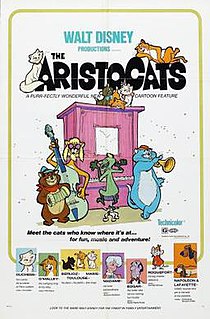 W
WThe Aristocats is a 1970 American animated romantic musical comedy film produced by Walt Disney Productions and directed by Wolfgang Reitherman. The 20th Disney animated feature film, the film is based on a story by Tom McGowan and Tom Rowe, and revolves around a family of aristocratic cats, and how an alley cat acquaintance helps them after a butler has kidnapped them to gain his mistress's fortune which was intended to go to them. The film features the voices of Phil Harris, Eva Gabor, Hermione Baddeley, Dean Clark, Sterling Holloway, Scatman Crothers, and Roddy Maude-Roxby.
 W
WBanjo the Woodpile Cat is a 1979 animated short film directed by Don Bluth. It follows the story of Banjo, an overly curious and rebellious kitten who, after getting into trouble for falling from a house to see if he could land on his feet, runs away from his woodpile home in his owners' farm in Payson, Utah by catching a truck to Salt Lake City. Produced in a shoestring budget, and created in Bluth's garage, the film took four years to make and it was the first production of Don Bluth Productions, later Sullivan Bluth Studios. It premiered theatrically in 1979, and at the USA Film Festival one year later. It was released on DVD by 20th Century Fox Home Entertainment in 2014.
 W
W"Basketball Jones featuring Tyrone Shoelaces" is a song by Cheech and Chong that first appeared on the 1973 album Los Cochinos.
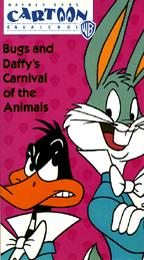 W
WBugs and Daffy's Carnival of the Animals is a 1976 live action/animated television special featuring the Looney Tunes characters Bugs Bunny and Daffy Duck and directed by Chuck Jones.
 W
WBugs Bunny: Superstar is a 1975 Looney Tunes documentary film narrated by Orson Welles and produced and directed by Larry Jackson. It was the first documentary to examine the history of the Warner Bros. cartoons, and includes nine Looney Tunes/Merrie Melodies cartoons which were previously released during the 1940s:What's Cookin' Doc? (1944), directed by Bob Clampett The Wild Hare (1940), directed by Tex Avery A Corny Concerto (1943), directed by Bob Clampett I Taw a Putty Tat (1948), directed by Friz Freleng Rhapsody Rabbit (1946), directed by Friz Freleng Walky Talky Hawky (1946), directed by Robert McKimson My Favorite Duck (1942), directed by Chuck Jones Hair-Raising Hare (1946), directed by Chuck Jones The Old Grey Hare (1944), directed by Bob Clampett
 W
WBugs Bunny's Christmas Carol is an eight-minute animated short film produced by Warner Bros. Television and DePatie-Freleng Enterprises and released in 1979 by Warner Bros. as part of the Christmas special, Bugs Bunny's Looney Christmas Tales.
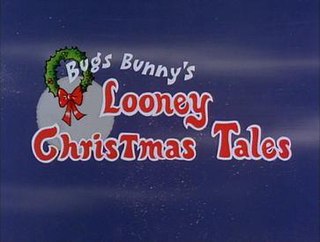 W
WBugs Bunny's Looney Christmas Tales is a 1979 animated Christmas television special featuring Bugs Bunny and other Looney Tunes characters in three newly created cartoon shorts with seasonal themes. It premiered on CBS on November 27, 1979. Audio and a clip from the special notably is in a scene in the movie Lethal Weapon where Martin Riggs tries to commit suicide.
 W
WBye, Bye, Blackboard is the 196th and final animated cartoon short subject in the Woody Woodpecker series. Released theatrically on September 1, 1972, the film was produced by Walter Lantz Productions and distributed by Universal. Walter Lantz then closed down his cartoon studio.
 W
WCharlotte's Web is a 1973 American animated musical drama film based upon the 1952 children's book of the same name by E. B. White, produced by Hanna-Barbera Productions and distributed by Paramount Pictures. The film, like the book, is about a pig named Wilbur who befriends an intelligent spider named Charlotte who saves him from being slaughtered. The film was directed by Charles A. Nichols and Iwao Takamoto from a story by Earl Hamner Jr., and features the voices of Debbie Reynolds, Paul Lynde, and Henry Gibson, alongside narration by Rex Allen. Charlotte's Web also features a song score of music and lyrics written by the Sherman Brothers, who had previously written music for family films like Mary Poppins (1964), The Jungle Book (1967), and Chitty Chitty Bang Bang (1968).
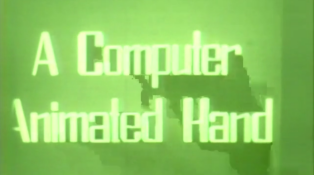 W
WA Computer Animated Hand is the title of a 1972 American computer-animated short film produced by Edwin Catmull and Fred Parke. Produced during Catmull's tenure at the University of Utah, the short was created for a graduate course project. After creating a model of his left hand, 350 triangles and polygons were drawn in ink on its surface. The model was digitized from the data and laboriously animated in a three-dimensional animation program that Catmull wrote.
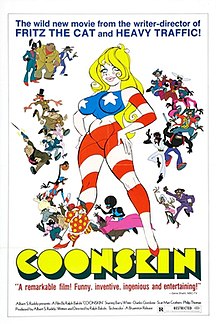 W
WCoonskin is a 1975 American live action/animated satire crime film written and directed by Ralph Bakshi, about an African American rabbit, fox, and bear who rise to the top of the organized crime racket in Harlem, encountering corrupt law enforcement, con artists, and the Mafia. The film, which combines live-action with animation, stars Philip Thomas, Charles Gordone, Barry White, and Scatman Crothers, all of whom appear in both live-action and animated sequences.
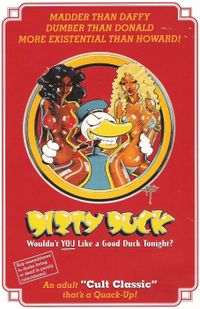 W
WDown and Dirty Duck, promoted under the abbreviated title Dirty Duck, is a 1974 American adult animated comedy film written and directed by Charles Swenson and starring Mark Volman and Howard Kaylan as the voices of a strait-laced, low-level white-collar worker named Willard and an unnamed duck, among other characters. The plot consists of a series of often abstract sequences, including plot material created by stars Kaylan, Volman, Robert Ridgely, and, according to the film's ending credits, various people Swenson encountered during the making of the film.
 W
WThe First Christmas: The Story of the First Christmas Snow is a 1975 Christmas stop motion animated television special produced by Rankin/Bass Productions which originally premiered on NBC on December 19, 1975. It is narrated by Angela Lansbury and co-stars Cyril Ritchard.
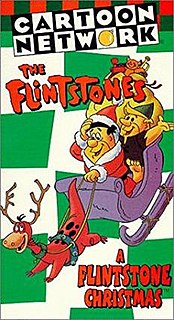 W
WA Flintstone Christmas is a 1977 animated Christmas television special featuring characters from The Flintstones franchise. It was produced by Hanna-Barbera and is the second Christmas-themed animated work in the franchise, after the 1964 episode "Christmas Flintstone." Both feature the character Fred Flintstone taking on the role of Santa Claus. The special first aired on NBC on December 7, 1977.
 W
WFritz the Cat is a 1972 American adult animated black comedy film written and directed by Ralph Bakshi in his directorial debut. Based on the comic strip by R. Crumb and starring Skip Hinnant, the film focuses on Fritz (Hinnant), a glib, womanizing and fraudulent cat in an anthropomorphic animal version of New York City during the mid-to-late 1960s. Fritz decides on a whim to drop out of college, interacts with inner city African American crows, unintentionally starts a race riot, and becomes a leftist revolutionary. The film is a satire focusing on American college life of the era, race relations, the free love movement and serves as a criticism of the countercultural political revolution and dishonest political activists.
 W
WFrosty's Winter Wonderland is a 1976 animated Christmas television special and a sequel to the 1969 special Frosty the Snowman, produced by Rankin/Bass Productions and animated by Topcraft. It is the second television special featuring the character Frosty the Snowman. It returns writer Romeo Muller, character designer Paul Coker, Jr., music composer Maury Laws and actor Jackie Vernon as the voice of Frosty, while Andy Griffith stars as the narrator with the rest of the cast consisting of Shelley Winters, Dennis Day, and Paul Frees. The special premiered on ABC on December 2, 1976.
 W
WHeavy Traffic is a 1973 American adult animated drama film written and directed by Ralph Bakshi. The film, which begins, ends, and occasionally combines with live-action, explores the often surreal fantasies of a young New York cartoonist named Michael Corleone, using pinball imagery as a metaphor for inner-city life. Heavy Traffic was Bakshi and producer Steve Krantz's follow-up to the film Fritz the Cat. Though producer Krantz made varied attempts to produce an R-rated film, Heavy Traffic was given an X rating by the MPAA. The film received largely positive reviews and is widely considered to be Bakshi's biggest critical success.
 W
WThe Hobbit is a 1977 American animated musical television special created by Rankin/Bass, a studio known for their holiday specials, and animated by Topcraft, a precursor to Studio Ghibli. The film is an adaptation of the 1937 book of the same name by J. R. R. Tolkien, and was first broadcast on NBC in the United States on Sunday, November 27, 1977.
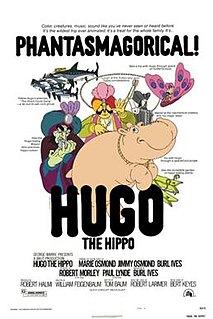 W
WHugo the Hippo is a 1975 animated film produced by the Pannónia Filmstúdió of Hungary and co-produced in the United States by Brut Productions, a division of French perfume company Faberge. It was released in Hungary in 1975 and in the United States in 1976 by 20th Century Fox. The film was directed by William Feigenbaum and József Gémes.
 W
WIt's Your First Kiss, Charlie Brown is the 16th prime-time animated television special based on the comic strip Peanuts by Charles M. Schulz. It was originally aired 8:00 PM, Monday, October 24, 1977 on the CBS-TV network. In this special, Charlie Brown worries when he is chosen to kiss his crush in a homecoming parade.
 W
WJack Frost is a 1979 Christmas stop motion animated television special produced by Rankin/Bass Productions. It was directed by Jules Bass and Arthur Rankin, Jr., written by Romeo Muller, narrated by Buddy Hackett, and starring Robert Morse, Debra Clinger, and Paul Frees. The special premiered on NBC on December 13, 1979, and tells the tale of Jack Frost and his adventures as a human. It airs annually on AMC as part of its Best Christmas Ever programming block.
 W
WJourney Back To Oz is a 1972 American animated adventure musical fantasy film produced by Filmation. It is loosely based on L. Frank Baum's second Oz novel, The Marvelous Land of Oz (1904), although Baum received no screen credit.
 W
WThe Lord of the Rings is a 1978 animated dark fantasy adventure film directed by Ralph Bakshi. It is an adaptation of J. R. R. Tolkien's high fantasy epic The Lord of the Rings, comprising The Fellowship of the Ring (1954) and the first half of The Two Towers (1954). Set in Middle-earth, the film follows a group of hobbits, elves, men, dwarves, and wizards who form a fellowship. They embark on a quest to destroy the One Ring made by the Dark Lord Sauron, and ensure his destruction.
 W
WThe Many Adventures of Winnie the Pooh is a 1977 American animated musical anthology film produced by Walt Disney Productions and distributed by Buena Vista Distribution. It is the 22nd Disney animated feature film and was first released on a double bill with The Littlest Horse Thieves on March 11, 1977.
 W
WThe Mouse and His Child is a 1977 Japanese-American animated film based on the 1967 novel of the same name by Russell Hoban.
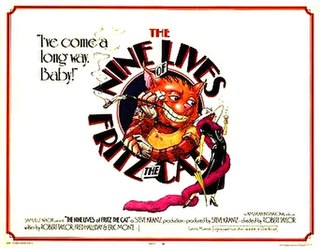 W
WThe Nine Lives of Fritz the Cat is a 1974 American adult animated anthology black comedy film directed by Robert Taylor as a sequel to Fritz the Cat, adapted from the comic strip by Robert Crumb. The only two people involved in the first film to work on the sequel were voice actor Skip Hinnant, and producer Steve Krantz. The film's music score was composed by jazz musician Tom Scott, and performed by Scott and his band The L.A. Express.
 W
WOliver Twist is a 1974 American animated adventure musical drama film directed by Hal Sutherland that is based on Charles Dickens's 1838 novel Oliver Twist. The film was the second and last to be produced by Filmation and distributed by Warner Bros. Pictures. Davy Jones, who played The Artful Dodger in the original Broadway production of Oliver!, reprises his role.
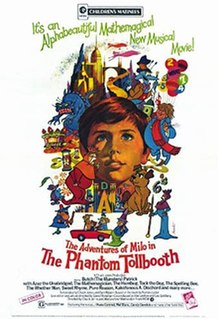 W
WThe Phantom Tollbooth is a 1970 American live-action/animated fantasy film based on Norton Juster's 1961 children's book of the same name. Produced by Chuck Jones at MGM Animation/Visual Arts, the film stars Butch Patrick as Milo, alongside the voice talents of Mel Blanc, Daws Butler, Candy Candido, Hans Conried, June Foray, Patti Gilbert, Shepard Menken, Cliff Norton, Larry Thor, and Les Tremayne. Jones also directed the film with Abe Levitow, while Dave Monahan directed the live-action segments.
 W
WQuasi at the Quackadero is a 1975 animated short by Sally Cruikshank. This cartoon follows two anthropomorphic ducks and a pet robot at an amusement park where phenomena such as time travel, telepathy, and reincarnation are exhibited as sideshow attractions. In 2009, it was selected for preservation in the United States National Film Registry by the Library of Congress.
 W
WRace for Your Life, Charlie Brown is a 1977 American animated adventure comedy film produced by United Feature Syndicate for Paramount Pictures, directed by Bill Melendez and Phil Roman, and the third in a series of films based on the Peanuts comic strip. It was the first Peanuts feature-length film produced after the death of composer Vince Guaraldi and used the same voice cast from the 1975 and 1976 TV specials, You're a Good Sport, Charlie Brown, Happy Anniversary, Charlie Brown, and It's Arbor Day, Charlie Brown, and the same voice cast member from the 1974 TV special, It's a Mystery, Charlie Brown. However, Liam Martin voiced Linus van Pelt for the last time in the movie, and went on to voice Charlie Brown in the 1978 TV special, What a Nightmare, Charlie Brown.
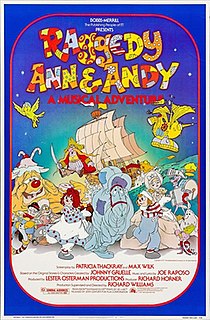 W
WRaggedy Ann & Andy: A Musical Adventure is a 1977 American live-action/animated musical fantasy film directed by Richard Williams, produced by the Bobbs-Merrill Company, a publishing arm of ITT, and released theatrically by 20th Century Fox. A 1941 short film had previously featured the Raggedy Ann and Andy characters created by Johnny Gruelle.
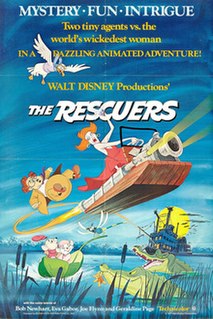 W
WThe Rescuers is a 1977 American animated adventure film produced by Walt Disney Productions and released by Buena Vista Distribution. The 23rd Disney animated feature film, the film is about the Rescue Aid Society, an international mouse organization headquartered in New York City and shadowing the United Nations, dedicated to helping abduction victims around the world at large. Two of these mice, jittery janitor Bernard and his co-agent, the elegant Miss Bianca, set out to rescue Penny, an orphan girl being held prisoner in the Devil's Bayou by treasure huntress Madame Medusa. The film is based on a series of books by Margery Sharp, most notably The Rescuers (1959) and Miss Bianca (1962).
 W
WRobin Hood is a 1973 American animated adventure comedy film produced by Walt Disney Productions and released by Buena Vista Distribution. Produced and directed by Wolfgang Reitherman, it is the 21st Disney animated feature film. The story follows the adventures of Robin Hood, Little John, and the inhabitants of Nottingham as they fight against the excessive taxation of Prince John, and Robin Hood wins the hand of Maid Marian. The film features the voices of Brian Bedford, Phil Harris, Peter Ustinov, Pat Buttram, Monica Evans, and Carole Shelley.
 W
WRudolph's Shiny New Year is a 1976 American-Japanese Christmas/New Year's stop motion animated television special and a sequel to the 1964 special Rudolph the Red-Nosed Reindeer produced by Rankin/Bass Productions. The special premiered on ABC on December 10, 1976. Three years later, it was also aired on TV Asahi in Japan on December 24, 1979 under the Japanese dub title 赤鼻のトナカイ ルドルフ物語.
 W
WSanta and the Three Bears is a 1970 animated featurette, which aired in syndication on television regularly during the holiday season.
 W
WSanta Claus is Comin' to Town is a 1970 stop motion Christmas television special produced by Rankin/Bass Productions in New York, New York. The film stars the voices of Fred Astaire, Mickey Rooney, Keenan Wynn, Robie Lester, Joan Gardner and Paul Frees, as well as an assistant song performance by the Westminster Children's Choir. The film tells the story of how Santa Claus and several Claus-related Christmas traditions came to be. It is based on the hit Christmas song "Santa Claus Is Comin' to Town", which was written by J. Fred Coots and Haven Gillespie for Leo Feist, Inc. and introduced on radio by Eddie Cantor in 1934, and the story of Saint Nicholas.
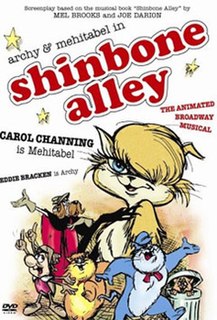 W
WShinbone Alley is a 1970 animated musical comedy film based on the Joe Darion, Mel Brooks, and George Kleinsinger musical of the same name as well as the original Archy and Mehitabel stories by Don Marquis. It was directed by John David Wilson. Eddie Bracken reprised his role from the Broadway musical; Carol Channing played the starring role originally performed by Eartha Kitt.
 W
WThe Small One is a 1978 American animated featurette produced by Walt Disney Productions and released theatrically by Buena Vista Distribution on December 16, 1978 with a re-issue of Pinocchio (1940). The story is based on a 1947 children's book of the same name by Charles Tazewell and was a project for the new generation of Disney animators including Don Bluth, Jerry Rees, Henry Selick, Gary Goldman, and John Pomeroy.
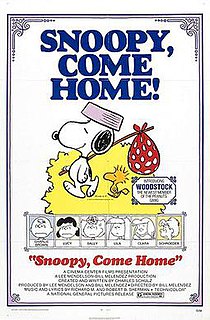 W
WSnoopy Come Home is a 1972 American animated musical comedy-drama film directed by Bill Melendez and written by Charles M. Schulz based on the Peanuts comic strip. The film marks the on-screen debut of Woodstock, who had first appeared in the strip in 1967. It was the only Peanuts film during composer Vince Guaraldi’s lifetime that did not have a score composed by him. Its music was composed by the Sherman Brothers, who composed the music for various Disney films like Mary Poppins (1964), The Jungle Book (1967), and Bedknobs and Broomsticks (1971). The film was released on August 9, 1972 by National General Pictures, produced by Lee Mendelson Films and Cinema Center Films. Despite receiving largely positive reviews, the film was a box-office bomb, grossing only $245,073 against a production budget of over $1 million.
 W
WThere's No Time for Love, Charlie Brown is the ninth prime-time animated TV specials based upon the popular comic strip Peanuts, by Charles M. Schulz. This marks the on-screen debut of Marcie, who first appeared on the comic strip in 1971. It was originally aired on the CBS network on March 11, 1973.
 W
WTreasure Island is a 1973 animated feature film directed by Hal Sutherland, produced by Filmation, and released by Warner Bros. In this adaptation of Robert Louis Stevenson's 1883 novel of the same name, Jim Hawkins travels with sidekick Hiccup the Mouse.
 W
W'Twas the Night Before Christmas is a 1974 animated Christmas television special produced by Rankin/Bass Productions and based on the famous 1823 poem that opens with this line. The special first originally aired on CBS on December 8, 1974 where it aired annually until 1994, when The Family Channel took over its syndication rights. AMC took over syndication rights for the special in 2018.
 W
WUncle Sam Magoo is a 1970 television special directed by Abe Levitow and written by Larry Markes, Henry G. Saperstein and Sam Rosen. The special stars Jim Backus as Mr. Magoo, Lennie Weinrib, Bob Holt, Patti Gilbert, Sid Grossfeld and Barney Phillips. The special aired on February 15, 1970, on NBC.
 W
WWhat a Nightmare, Charlie Brown! is the 17th prime-time animated television special based on the comic strip Peanuts by Charles M. Schulz. It originally aired on Thursday, February 23, 1978, at 8:00 P.M. ET/PT on CBS. The special is unusual in that Snoopy and Charlie Brown are the only members of the Peanuts cast to appear in it. The plot is similar to that of Jack London's The Call of the Wild, and centers on Snoopy having a nightmare about being an Arctic sled dog. This was the first special Bill Melendez directed since 1973's A Charlie Brown Thanksgiving.
 W
WWizards is a 1977 American animated post-apocalyptic science fantasy film directed, produced and written by Ralph Bakshi and distributed by 20th Century Fox. The film follows a battle between two wizards of opposing powers, one representing the forces of magic and the other representing the forces of industrial technology.
 W
WYabba Dabba Doo! The Happy World of Hanna-Barbera is a 1977 American live-action/animated television special produced by Hanna-Barbera Productions which premiered on CBS on Thanksgiving Day, November 24, 1977.
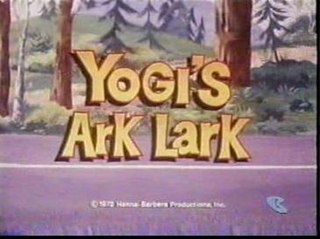 W
WYogi's Ark Lark is a 1972 animated television film produced by Hanna-Barbera, intended to raise ecological awareness. It was broadcast on September 16, 1972, as part of The ABC Saturday Superstar Movie and served as the pilot for Yogi's Gang.
 W
WYou're Not Elected, Charlie Brown is the eighth prime-time animated TV special produced based upon the popular comic strip Peanuts by Charles M. Schulz, and the 10th one to air. It originally aired on CBS on October 29, 1972, nine days before the 1972 United States presidential election between Senator George McGovern and incumbent Richard Nixon.